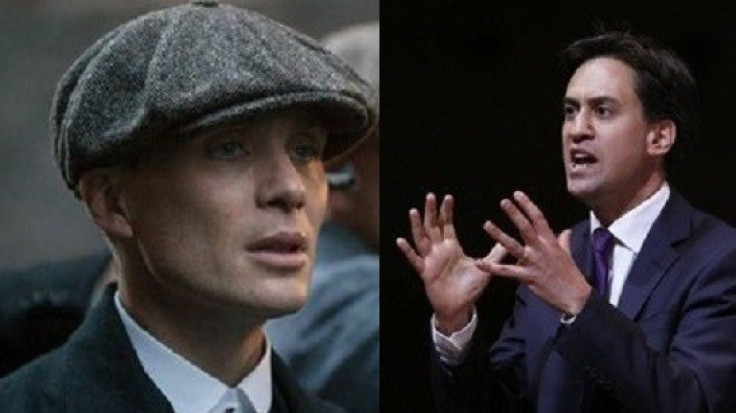Ed Miliband Plays a 'Peaky Blinder' in Battle with Big Energy

Nobody who watched Ed Miliband's conference speech was left in any doubt that this was his defining moment, the speech in which he nailed his colours so firmly to the mast that no hurricane-force winds could tear them off.
Like the working class anti-hero Thomas Shelby in the BBC2 post-WW1 gangster drama Peaky Blinders the boy from Hampstead suddenly pulled off his iconic cloth cap, its brim studded with sharpened blades of leftist populism, and started slashing away at the smug Mr Bigs of Big Energy. His (Labour party) gang in the spit-and-sawdust pub, aka the bland Brighton conference centre, cheered on their dashing, slashing hero; his enemies looked on in wide-eyed horror.
As with the Cillian Murphy character in the drama taking on the racetrack king, Billy Kimber, the Labour leader is thinking several moves ahead. He knew that hurricane would hit and he knew it would be blowing from all the usual sources, the right-wing media, big business, the energy companies and the Tories and their allies.
He also knew they would claim his true colours had been revealed as crimson red and that he was heralding in an old-style, socialist Labour party committed to state control.
So when he awoke to headlines screaming: "Back to the Bad Old Days", "Ed's Insane Energy Policy" and "Red Ed Power Cut Fear" he was ready for them and came out fighting. But this was not just what he was expecting - it is what he wanted.
Make no mistake, Ed Miliband - "Red Ed" as he has now accepted will be his moniker for ever more - is looking for a fight.
Profits rise
Ever since his 2010 leadership victory he has been signalling his belief that voters were ready for a redefinition of where the centre of British politics lies - and it is to the left of where all post-Thatcher governments have put it. This speech was the culmination of that project.
As he repeated over and again in his speech, he is fighting for the ordinary, hard-pressed "squeezed middle", the vast majority of people who have felt the full force of the economic crisis and who despair that any government has the courage to take on the institutions that landed them in the mess and yet appear to be carrying on regardless.
Those people have seen their energy bills soaring over recent years, yet never seem to see significant reductions when costs fall.
Gas bills have risen by 41% and electricity bills 20% since 2007, according to the Office for National Statistics. Meanwhile the biggest six energy companies - EDF, E.On, NPower, British Gas, Scottish Power and SSE - have seen their profits rise from £2.15bn in 2009 to £3.74bn in 2012.
Miliband's calculation is that voters no longer trust big business to consider their needs above profits or executive bonuses and neither do they believe them when they make threats about going bust or pulling out of the UK.
As he said in a tough-talking letter to the big energy companies: "You and I know that the public have lost faith in this market. There is a crisis of confidence. We face a stark choice. We can work together on the basis of this price freeze to make the market work in the future. Or you can reinforce in the public mind that you are part of the problem not the solution."
It is not just the energy companies. Miliband also has his sights set on developers who refuse to build on vacant land in the belief it will be more profitable to hold back until the market moves. His "use it or lose it" slogan hints at the possibility that he would be willing to take action there as well.
Turn out the lights
His opponents have whipped up a storm clearly designed to scare the life out of voters with suggestions there would be a Mugabe-style land grab and that lights would go out the day Miliband was elected.
The Sun famously warned people against voting for Labour's Neil Kinnock in 1992 with the warning: "Will the last person to leave Britain please turn out the lights".
The message following Miliband's speech is that he would do the job himself and pitch the UK into darkness, in all senses of the word, if he ever crossed the threshold of No 10.
But what has sparked much of this hysteria is the fear on the right that Miliband's attack on the energy companies is not just popular but, as party focus groups suggested, possibly enough to see him winning the next election.
Only a year ago it was Prime Minister David Cameron who recognised the strength of public feeling on this issue and was promising to force energy companies to put all consumers on the lowest possible tariff.
That territory is now firmly Miliband's and the attacks will only become more fierce as the election approaches.
Irrespective of the rights and wrongs of Miliband's new policies, the test for Labour is whether it can hold its nerve under fire. To avoid the nightmarish shellshock that haunts Somme veteran Thomas Selby, Miliband should have his tin hat handy.
© Copyright IBTimes 2024. All rights reserved.






